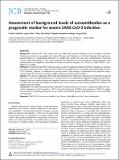Files in this item
Assessment of background levels of autoantibodies as a prognostic marker for severe SARS-CoV-2 infection
Item metadata
| dc.contributor.author | Sullivan, Francis | |
| dc.contributor.author | Tello, Agnes | |
| dc.contributor.author | Rauchhaus, Petra | |
| dc.contributor.author | Hernandez Santiago, Virginia | |
| dc.contributor.author | Daly, Fergus | |
| dc.date.accessioned | 2022-05-05T12:30:14Z | |
| dc.date.available | 2022-05-05T12:30:14Z | |
| dc.date.issued | 2022-05-03 | |
| dc.identifier | 279431495 | |
| dc.identifier | 4035592b-672e-436e-b7cf-e0fa9d305299 | |
| dc.identifier | 85130482767 | |
| dc.identifier.citation | Sullivan , F , Tello , A , Rauchhaus , P , Hernandez Santiago , V & Daly , F 2022 , ' Assessment of background levels of autoantibodies as a prognostic marker for severe SARS-CoV-2 infection ' , Journal of Circulating Biomarkers , vol. 11 , pp. 24-27 . https://doi.org/10.33393/jcb.2022.2337 | en |
| dc.identifier.issn | 1849-4544 | |
| dc.identifier.other | ORCID: /0000-0002-6623-4964/work/112711497 | |
| dc.identifier.other | ORCID: /0000-0002-8544-1483/work/112711515 | |
| dc.identifier.uri | https://hdl.handle.net/10023/25286 | |
| dc.description | This project was funded by The Lung Foundation. | en |
| dc.description.abstract | Background : Patients with more severe forms of SARS-CoV-2 exhibit activation of immunological cascades. Participants (current or ex-smokers with at least 20 years pack history) in a trial (Early Diagnosis of Lung Cancer, Scotland [ECLS]) of autoantibody detection to predict lung cancer risk had seven autoantibodies measured 5 years before the pandemic. This study compared the response to Covid infection in study participants who tested positive and negative to antibodies to tumour-associated antigens: p53, NY-ESO-1, CAGE, GBU4-5, HuD, MAGE A4 and SOX2. Methods : Autoantibody data from the ECLS study was deterministically linked to the EAVE II database, a national, real-time prospective cohort using Scotland’s health data infrastructure, to describe the epidemiology of SARS-CoV-2 infection, patterns of healthcare use and outcomes. The strength of associations was explored using a network algorithm for exact contingency table significance testing by permutation. Results : There were no significant differences discerned between SARS-CoV-2 test results and EarlyCDT-Lung test results (p = 0.734). An additional analysis of intensive care unit (ICU) admissions detected no significant differences between those who tested positive and negative. Subgroup analyses showed no difference in COVID-19 positivity or death rates amongst those diagnosed with chronic obstructive pulmonary disease (COPD) with positive and negative EarlyCDT results. Conclusions : This hypothesis-generating study demonstrated no clinically valuable or statistically significant associations between EarlyCDT positivity in 2013-15 and the likelihood of SARS-CoV-2 positivity in 2020, ICU admission or death in all participants (current or ex-smokers with at least 20 years pack history) or in those with COPD or lung cancer. | |
| dc.format.extent | 4 | |
| dc.format.extent | 300570 | |
| dc.language.iso | eng | |
| dc.relation.ispartof | Journal of Circulating Biomarkers | en |
| dc.subject | COVID-19 | en |
| dc.subject | Current or ex-smokers | en |
| dc.subject | Lung cancer | en |
| dc.subject | Mortality prediction | en |
| dc.subject | Serum biomarkers | en |
| dc.subject | QR180 Immunology | en |
| dc.subject | 3rd-DAS | en |
| dc.subject | SDG 3 - Good Health and Well-being | en |
| dc.subject.lcc | QR180 | en |
| dc.title | Assessment of background levels of autoantibodies as a prognostic marker for severe SARS-CoV-2 infection | en |
| dc.type | Journal article | en |
| dc.contributor.institution | University of St Andrews. Sir James Mackenzie Institute for Early Diagnosis | en |
| dc.contributor.institution | University of St Andrews. Population and Behavioural Science Division | en |
| dc.contributor.institution | University of St Andrews. School of Medicine | en |
| dc.identifier.doi | https://doi.org/10.33393/jcb.2022.2337 | |
| dc.description.status | Peer reviewed | en |
This item appears in the following Collection(s)
Items in the St Andrews Research Repository are protected by copyright, with all rights reserved, unless otherwise indicated.

